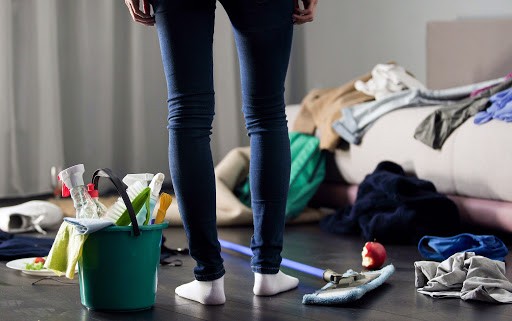Seven Pillars of Mental Health Stability
APR 22, 2024Mental health stability is a state where one can cope with everyday stressors, maintain positive mental well-being, and navigate life's challenges with resilience.
Read More
Move over fad diets and quick-fix exercise programs—the latest health craze is one for your mental health and it’s come in the form of cleaning!
There are a few names for it: decluttering, tidying, minimalism, purging. Whatever you want to call it, there’s no denying that the concept of getting rid of things has gained a following recently.
The Netflix series, "Tidying Up with Marie Kondo," has brought this trend to the forefront of social media and pop culture. The show follows Kondo to several family homes to teach them how to tidy up using a method she developed called the KonMari Method™. Netflix’s twitter account reveals hundreds of photos of changes that its followers had made just days after the series released, which, not surprisingly was in January (just in time for resolutions). People are celebrating the new-found freedom that comes with paring down, and thrift stores are celebrating the influx of inventory. As the saying goes, “tidy home, tidy mind.”
Between authors like Kondo and Omaha native, Joshua Becker—writer of "More of Less," "Simplify," and "The Minimalist Home"—there are a great deal of helpful tips out there for anyone interested in seeing what all the fuss is about.
According to KonMari.com, Kondo’s method offers an approach that moves through different categories and builds upon each phase:
"The KonMari Method™ encourages tidying by category – not by location – beginning with clothes, then moving on to books, papers, komono (miscellaneous items), and, finally, sentimental items. Keep only those things that speak to the heart, and discard items that no longer spark joy. Thank them for their service – then let them go."
If you fancy a more traditional approach, break your home into spaces, and don’t try to do too much all at once. Approach the task one room at a time (living room, kitchen, bedroom, etc…)
Becker recommends starting with a simple, step-by-step process as a guide:
Whichever method you choose, you’ll be doing yourself a favor by organizing your living space. Once we clear our space of visual clutter, we allow our minds to be less distracted and focus on things that we truly value. Minimizing and tidying can be a helpful way to establish our living spaces as places of rest and togetherness, rather than places that collect our belongings.
It’s important to note that hoarding and accumulating possessions can be a symptom of a bigger issue such as anxiety, depression or even mania. If you’re concerned about yourself or a loved one, it may be time to contact a mental health provider.
Tidying up doesn’t mean that we have it all figured out, but it can set us up to focus on who we are and what’s most important to us.

Mental health stability is a state where one can cope with everyday stressors, maintain positive mental well-being, and navigate life's challenges with resilience.
Read More
Our child adolescent psychiatrist offers tips to help parents balance work, household and family needs while making summer a memorable time for children.
Read More
An estimated 9% of the US population will have an eating disorder in their lifetime. That’s nearly one in 10, or 28.8 million Americans.
Read MoreWhen you need local health information from a trusted source, turn to the CHI Health Better You eNewsletter.